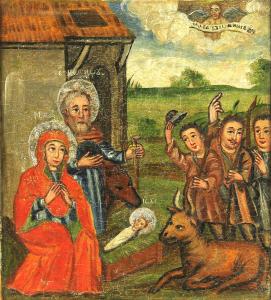(Lectionary for December 24, 2017)
 Any preacher worth her salt (and armed with a measure of pepper!) both longs for Christmas and trembles in fear before it. Good grief (to quote a famous man-child), it is Christmas, for heaven’s sake! What can possibly go wrong? The children’s pageant has gone off without a hitch (well, save that little sheep who wet her fleece), the choir has performed with energy and conviction one more rendition of Handel’s redoubtable work, at least the parts not too far beyond their capabilities, and the call for end-of-year cash has been heeded—again, thank the good God. It’s Christmas, for all our sakes, and the congregation has assembled to hear you preach something about the day. Ok, but what exactly?
Any preacher worth her salt (and armed with a measure of pepper!) both longs for Christmas and trembles in fear before it. Good grief (to quote a famous man-child), it is Christmas, for heaven’s sake! What can possibly go wrong? The children’s pageant has gone off without a hitch (well, save that little sheep who wet her fleece), the choir has performed with energy and conviction one more rendition of Handel’s redoubtable work, at least the parts not too far beyond their capabilities, and the call for end-of-year cash has been heeded—again, thank the good God. It’s Christmas, for all our sakes, and the congregation has assembled to hear you preach something about the day. Ok, but what exactly?
I have been fascinated by the many articles that have appeared on the Patheos Progressive Christian site over the past few weeks. The majority of them appear to be deeply concerned with what one really needs to believe this Christmas. Virgin birth? Maybe or maybe not. A literal Incarnation? Perhaps or perhaps not. What about those shepherds? What season of the year was this shepherding supposed to represent? And on and on, seeking some kinds of historical rationale for the events that Luke and Matthew have offered to readers and hearers for two thousand years. Bunk, say I! History is an interesting question, of course, and one I have spent a good bit of my scholarly life wondering and thinking about. But Christmas is not the time for history lessons or rationales or proving this or disproving that. It is the story that counts, always has been and always will be.
 And this year it is Luke’s version, so leave out the wise guys and their gifts and stick with the rejoicing angels and their shepherds. And don’t forget the night stars that appear as backup to the heavenly angelic chorus, but avoid the star that led the wise ones to find the manger. That too is Matthew. Give us those front page men, Caesar and Quirinius, who become in Luke’s hands mere adjuncts to the real story of the pregnant teenager and her reluctant companion, usually consigned to the back sections of the paper or are not found in the paper at all. The shepherds, often seen as untrustworthy rogues of the countryside, are the genuine heroes here, listening carefully to the angels, rushing to discover the baby they were singing about, and then afterwards glorifying and praising God for all they had heard and seen. It is a grand story and has survived countless attempts by mountebanks, charlatans, and well-meaning “scholars” to tame it, cut it down to size, historicize it, de-historicize it, or demythologize it. But the story stands unshakable, unimpeachable, powerful in its truth. God has shown up in the world in a way no one expected, a baby born in a stable (or cave, or manger—details of your choice), born to an unknown and insignificant couple, unmarried, forced to leave their home to head south due to government demand, refused entry into a warm bed for the birth but delivered among the animals. O Magnum Mysterium indeed!
And this year it is Luke’s version, so leave out the wise guys and their gifts and stick with the rejoicing angels and their shepherds. And don’t forget the night stars that appear as backup to the heavenly angelic chorus, but avoid the star that led the wise ones to find the manger. That too is Matthew. Give us those front page men, Caesar and Quirinius, who become in Luke’s hands mere adjuncts to the real story of the pregnant teenager and her reluctant companion, usually consigned to the back sections of the paper or are not found in the paper at all. The shepherds, often seen as untrustworthy rogues of the countryside, are the genuine heroes here, listening carefully to the angels, rushing to discover the baby they were singing about, and then afterwards glorifying and praising God for all they had heard and seen. It is a grand story and has survived countless attempts by mountebanks, charlatans, and well-meaning “scholars” to tame it, cut it down to size, historicize it, de-historicize it, or demythologize it. But the story stands unshakable, unimpeachable, powerful in its truth. God has shown up in the world in a way no one expected, a baby born in a stable (or cave, or manger—details of your choice), born to an unknown and insignificant couple, unmarried, forced to leave their home to head south due to government demand, refused entry into a warm bed for the birth but delivered among the animals. O Magnum Mysterium indeed!
And if you like, you can add some delightful colors from old Isaiah with his arm- baring God, his exultant, sweet-footed messengers who announce peace, whose sentinels sing aloud for joy when they see YHWH return in triumph to Zion. That could add distinct flavors to your telling, but tell it, the story, you must.
That story creates in us the hope of God for all of us, the poor and the rich, the high and the low, the clever and the not so clever. It is that story that people come to hear, to believe once again that they are not alone in a cold universe, but are greatly loved and cared for by the one that made all things. When they all raise their candles high, may they have resonating in their hearts and minds the story that you have just told them with power and joy and delight as only you can tell it. No proofs, please. No half-baked historical probing. Not today. Just the story. After all, you, preacher, need it, too, to continue to do the work, to continue to represent the God who has called you to it. It is finally the story, stupid. You just cannot mess that up, now can you?
(Images from Wikimedia Commons)













